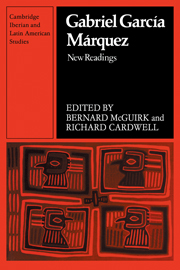Book contents
- Frontmatter
- Contents
- Note on the translations
- List of contributors
- Introduction
- 1 Characterization in the early fiction of Gabriel García Márquez
- 2 Beware of gift-bearing tales: reading ‘Baltazar's Prodigious Afternoon’ according to Marcel Mauss
- 3 The body as political instrument: communication in No One Writes to the Colonel
- 4 Magical realism and the theme of incest in One Hundred Years of Solitude
- 5 Translation and genealogy: One Hundred Years of Solitude
- 6 The humour of One Hundred Years of Solitude
- 7 On ‘magical’ and social realism in García Márquez
- 8 Aspects of narrative structure in The Incredible and Sad Story of the Innocent Eréndira and her Heartless Grandmother
- 9 Language and power in The Autumn of the Patriarch
- 10 Writing and ritual in Chronicle of a Death Foretold
- 11 Free-play of fore-play: the fiction of non-consummation: speculations on Chronicle of a Death Foretold
- 12 A prospective post-script : apropos of Love in the Times of Cholera
- The solitude of Latin America: Nobel address 1982
- Select bibliography
- Index
11 - Free-play of fore-play: the fiction of non-consummation: speculations on Chronicle of a Death Foretold
Published online by Cambridge University Press: 05 November 2011
- Frontmatter
- Contents
- Note on the translations
- List of contributors
- Introduction
- 1 Characterization in the early fiction of Gabriel García Márquez
- 2 Beware of gift-bearing tales: reading ‘Baltazar's Prodigious Afternoon’ according to Marcel Mauss
- 3 The body as political instrument: communication in No One Writes to the Colonel
- 4 Magical realism and the theme of incest in One Hundred Years of Solitude
- 5 Translation and genealogy: One Hundred Years of Solitude
- 6 The humour of One Hundred Years of Solitude
- 7 On ‘magical’ and social realism in García Márquez
- 8 Aspects of narrative structure in The Incredible and Sad Story of the Innocent Eréndira and her Heartless Grandmother
- 9 Language and power in The Autumn of the Patriarch
- 10 Writing and ritual in Chronicle of a Death Foretold
- 11 Free-play of fore-play: the fiction of non-consummation: speculations on Chronicle of a Death Foretold
- 12 A prospective post-script : apropos of Love in the Times of Cholera
- The solitude of Latin America: Nobel address 1982
- Select bibliography
- Index
Summary
‘Speculations – On Freud’
In his text something must answer for the speculation of which he speaks … I also maintain that speculation is not only a mode of research named by Freud, not only the object of his discourse, but also the operation of his writing, what he is doing in writing what he is writing here, that which makes him do it and that which he causes to be done, that which makes him write and that which he causes to be written.
(Jacques Derrida)García Márquez's text, Chronicle of a Death Foretold, also opens with an epigraph, from the sixteenth-century Portuguese playwright Gil Vicente: ‘La caza de amor/es de altanería’ (translated by Gregory Rabassa as ‘the hunt for love is haughty falconry’). A first speculation concerns the multiple pun(ning) which opens the novel, for ‘altaneria’ means height, high flight, falconry, haughtiness and pride; ‘de amor’ might also mean ‘of love’ and the second ‘de’, too, might mean ‘of’ or ‘for’. To the Colombian ear, ‘la caza (casa) de amor(es)’, too, might prefigure the brothel of Maria Alejandrina Cervantes. ‘Opens the novel’, then, in all senses, invites open reading rather than interpretative closure. This study of Chronicle draws upon several of the speculations applied by Derrida to Freud's Beyond the Pleasure Principle and, in its turn, extends the mirroring process of ‘speculary reflection’ by adducing others.
- Type
- Chapter
- Information
- Gabriel García MárquezNew Readings, pp. 169 - 190Publisher: Cambridge University PressPrint publication year: 1987
- 2
- Cited by



